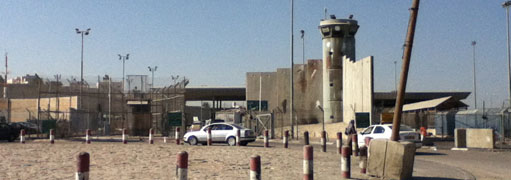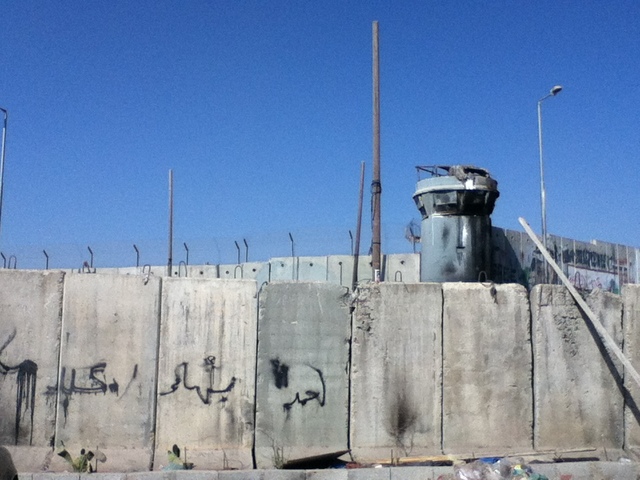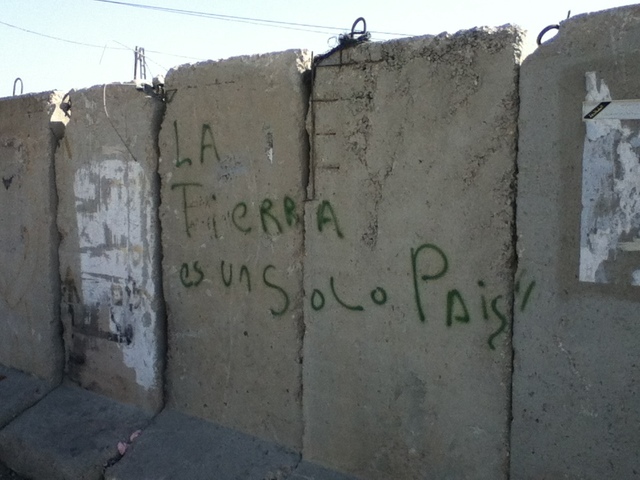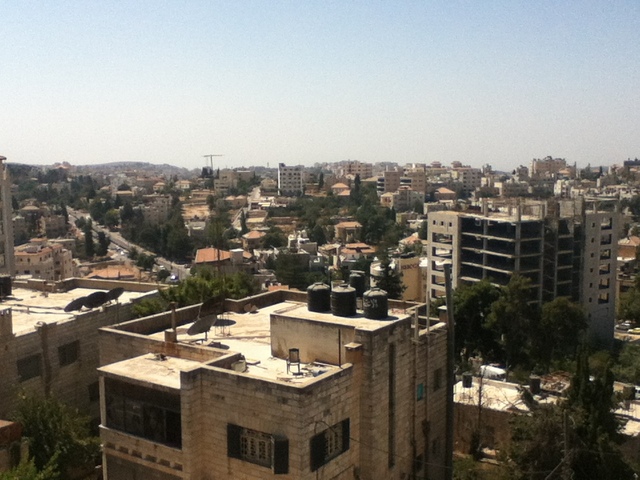My first day in the West Bank was also the first time I ever got tear-gassed.I’ve worked with the (un)Occupy movement in Albuquerque since its inception, often writing about it for the Alibi. I’ve participated in dozens of Occupy-related demonstrations around the country, including the anti-NATO protests in Chicago. I was arrested once and nearly arrested more times than I can count. I’ve seen the police get pretty brutal, beating people with batons, shoving them to the ground, dragging them off in handcuffs in various painful-looking ways. But I’d never actually been tear-gassed until I came to Palestine. And I was just trying to cross the border.It’s necessary here to break down a few basic facts about Israel and Palestine, but I’ll keep it as short and nonboring as possible.In 1948, Israel declared its independence with the support of the newly formed United Nations and was immediately recognized by the U.S. and the U.S.S.R., taking control of much of what had been British-controlled Palestine. The nations bordering Israel, including Egypt, Transjordan and Syria, attacked Israel, but by 1949, Israel had definitively won the war and taken even more territory than it was initially given by the United Nations. What remained was divided into two sections: the West Bank, handed over to Jordanian control, and Gaza, which Egypt would administer. These events are known to Palestinians as Al Nakba, or "the catastrophe," because so many lives and so much land were lost.In 1967, Israel attacked Egypt, drawing Jordan and Syria into war as well. The resulting conflict is known as the "Six-Day War" because, well, it only lasted six days. At the end of it, Israel had taken control of Gaza and the West Bank, as well as Egypt’s Sinai Peninsula and Syria’s Golan Heights.Israel returned the Sinai to Egypt in 1979, but the vast majority of the Golan Heights remains under Israeli control. Following a 1993 peace deal known as the Oslo Accords between Israel and Palestinian resistance fighters, parts of the region were given over to a democratically elected Palestinian government.But much of the West Bank remains under Israeli military occupation. And Gaza is effectively under siege. By constructing settlements in the West Bank, Israel continues to absorb more and more land. It’s a recipe for a volatile situation.On Thursday, Nov. 28, the United Nations upgraded Palestine to the status of “non-member observer state,” issuing Palestine what President Mahmoud Abbas called a “birth certificate.” If all of this is making your head spin, consider that it’s only a very brief overview of the situation, leaving out many important milestones along the way. Adding to the confusion is the fact that, as I quickly learned, history is a fluid, hotly contested concept here.To illustrate this point, I’ll return to the story of my first day in the West Bank. I arrived in the de facto capital of Ramallah at the invitation of a friend who had an idea to start a sort of Palestinian press corps. She met me at the airport in Tel Aviv, and we headed straight to the West Bank, where I met another journalist on her way to a protest in Jerusalem.Traveling from the West Bank to Jerusalem requires crossing an Israeli-controlled checkpoint. We arrived at the Qalandiya checkpoint just outside Ramallah to find dozens of people running away. “This is bad,” my friend said. “We’re journalists.” “Bad is good,” I replied, and we headed toward the checkpoint. As we made our way onto the public bus bound for Jerusalem, we saw a teenager throw a rock at an Israeli guard tower. We made it inside the bus before the soldiers fired back.The bang of tear gas canisters exploding was accompanied by clouds of white smoke that wafted our way and crept in the windows of the bus. Our fellow passengers covered their mouths and coughed as a burning sensation filled our noses, eyes and throats. The amazing thing was the guys running the busses weren’t fazed at all. They didn’t even get out of their chairs in the parking lot. Tear gas and skirmishes are so common, they’re non-events. As the clouds of tear gas dissipated, the bus made its way to Jerusalem and we found the demonstration, where I was introduced to the contested history of Israel. The protest was outside the City of David tourism site, built around archaeological digs purporting to contain evidence of the biblical rule of King David. This sounds simple enough, but in this region, it never is.Elad, a private company that runs the City of David, has been accused of unsound archaeological practices designed to cover up anything contradicting the biblical version of events, especially evidence relating to the history of Arabs in the area. Besides the dispute over history, the City of David features another recurring theme in Israeli and Palestinian relations: home demolitions. The site of the City of David overlaps with the Palestinian village of Silwan, and many residents have been displaced in order for excavations to continue. Even the Lonely Planet tour book got dragged into the controversy, ironically by trying to avoid it. In its recommendation to readers to visit the City of David, Lonely Planet makes no mention of contested versions of history, home demolitions or even the village of Silwan, leading activists to call on the authors to rewrite the City of David section. The demonstration turned out to be fairly small and calm. It was organized by Israeli activists, and I was told by several people that Israel doesn’t tear gas its own citizens. They have no problem using tear gas, rubber bullets and even live ammunition on Palestinian demonstrators, though, as I learned through my frequent attendance of protests in the West Bank. I myself, in fact, have been shot at with live ammunition while filming a protest in the village of Nabi Saleh (well, OK, shot over—I don’t think the Israeli soldiers were actually trying to hit anyone). The demonstrators were unarmed but for some rocks and one burning tire. Back in Jerusalem, my first day in the West Bank, I learned that the demonstration was occasioned by an annual conference of the Elad corporation in charge of the City of David. The theme of this year’s conference, I was told, was "It’s Not Political, It’s Archaeological."This is obviously false. If there’s one thing I’ve learned since coming to Palestine almost three months ago, it’s that everything is political—even archaeology.
Andrew Beale is a journalist, Alibi contributor and sometime social activist. He lives in Ramallah in the Occupied Palestinian Territories.The views expressed are solely those of the author.








